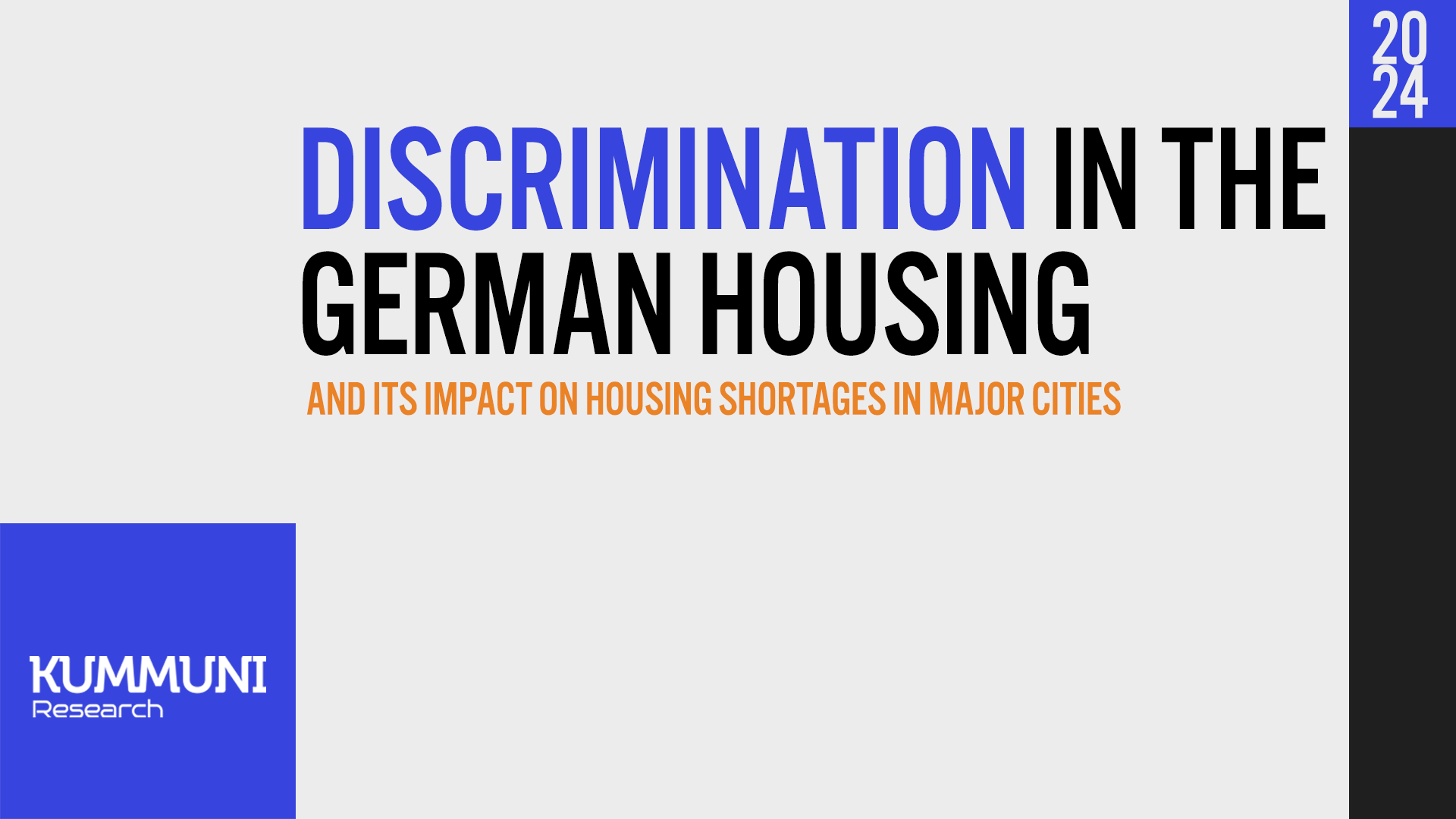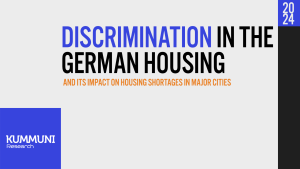Introduction
Discrimination in the housing market is a persistent issue in Germany, particularly in its major cities. Despite Germany’s strong legal framework aimed at promoting equality, various forms of bias continue to affect individuals’ ability to secure housing. These discriminatory practices not only exacerbate social inequality but also contribute significantly to the housing shortages that plague many of Germany’s urban centers. This article explores the nature of discrimination in the German housing market, the groups most affected by it, how these practices intensify the housing crisis in cities like Berlin, Munich, and Hamburg, and how discrimination itself can cause or enable housing shortages.
Historical Context of Housing Discrimination in Germany
Housing discrimination in Germany has deep historical roots, shaped by post-war housing policies and successive waves of immigration. In the aftermath of World War II, Germany faced a significant housing shortage. The influx of Gastarbeiter (guest workers) from countries like Turkey in the 1960s and 1970s was initially seen as a temporary solution to labor shortages, but many of these workers settled permanently. However, the housing policies of the time did not adequately address their needs, leading to the marginalization of these communities in urban areas. This period laid the groundwork for the discriminatory attitudes that persist in the housing market today.
The more recent waves of immigration from the Middle East, Africa, and Eastern Europe have further complicated the housing landscape. These immigrants, often fleeing conflict or economic hardship, face significant barriers to integration, including discrimination in the housing market. As Germany’s cities grew and diversified, these groups were often concentrated in less desirable neighborhoods, reinforcing segregation and limiting their access to opportunities.
Legal Framework and Its Effectiveness
Germany has a robust legal framework designed to combat discrimination, including the General Equal Treatment Act (Allgemeines Gleichbehandlungsgesetz, AGG) of 2006, which prohibits discrimination based on race, ethnicity, religion, gender, disability, age, or sexual orientation in various areas, including housing. The AGG provides a legal basis for individuals to challenge discriminatory practices and seek redress in court.
However, the effectiveness of the AGG in combating housing discrimination has been limited by several factors. First, many victims of discrimination are unaware of their rights under the AGG or are reluctant to pursue legal action due to the complexities and costs involved. Additionally, proving discrimination in housing can be challenging, as it often involves subtle or indirect practices that are difficult to document. While there have been some notable legal cases where housing discrimination was successfully challenged, these remain exceptions rather than the norm (Antidiskriminierungsstelle des Bundes, 2021).
Comparative Analysis with Other Countries
When compared to other European countries, Germany’s challenges with housing discrimination are not unique but share similarities with cities like Paris, London, and Amsterdam. For example, in Paris, housing discrimination against North African immigrants is well-documented, leading to similar patterns of segregation and exclusion (Bourgeois, 2018). London faces its own set of challenges with discrimination against Black and Asian minorities in both the rental and ownership markets (Shelter, 2020). While Germany has made strides in addressing these issues, its approach could benefit from examining successful strategies employed in other countries, such as more robust enforcement of anti-discrimination laws and the promotion of inclusive housing policies.
On a global scale, cities like New York and Toronto have implemented various measures to combat housing discrimination, including strict enforcement of fair housing laws and public awareness campaigns. Germany could learn from these examples by enhancing its legal enforcement mechanisms and adopting a more proactive stance in promoting housing equity.
Impact on Specific Groups
The impact of housing discrimination in Germany is felt most acutely by certain minority groups. Individuals of Turkish, Arabic, or African descent, for instance, often face multiple layers of discrimination based on race, religion, and socioeconomic status. This discrimination limits their housing options, forcing them into overcrowded and underserved neighborhoods where access to quality housing, education, and employment opportunities is restricted (Berlin Institute for Empirical Integration and Migration Research, 2020).
LGBTQ+ individuals also face significant challenges in the housing market. Despite legal protections, they often encounter discrimination from landlords who may hold prejudiced views or who fear backlash from other tenants. This can lead to difficulties in securing housing in safe and supportive communities, further marginalizing these individuals (Stadtforschung, 2019).
Moreover, refugees and asylum seekers, many of whom come from war-torn regions, face some of the most severe forms of discrimination. Their precarious legal status, combined with widespread prejudices, often leaves them with no choice but to accept substandard or overcrowded housing conditions (Pro Asyl, 2022). These groups are also more likely to be steered away from certain neighborhoods, reinforcing patterns of segregation and social exclusion.
Government and NGO Initiatives
Addressing housing discrimination in Germany requires a multi-faceted approach involving both government action and the work of non-governmental organizations (NGOs). The German government has implemented various programs aimed at promoting integration and combating discrimination. These include housing subsidies for low-income families, initiatives to increase the supply of affordable housing, and educational campaigns to raise awareness of anti-discrimination laws.
NGOs play a crucial role in this effort by providing legal support, advocacy, and community outreach. Organizations like the Antidiskriminierungsstelle des Bundes (Federal Anti-Discrimination Agency) offer resources for individuals facing discrimination, including legal advice and assistance in filing complaints. Meanwhile, local NGOs work directly with affected communities to empower individuals and advocate for policy changes at the municipal and federal levels (Antidiskriminierungsstelle des Bundes, 2021).
Despite these efforts, there is a need for greater coordination and investment in anti-discrimination initiatives. Government programs often lack sufficient funding, and NGOs are frequently overwhelmed by the demand for their services. To effectively combat housing discrimination, Germany must prioritize these initiatives and ensure that they are adequately resourced and supported.
Economic Analysis of Housing Shortages
The housing shortages in Germany’s major cities are driven by a complex interplay of supply and demand dynamics, exacerbated by discriminatory practices. Over the past decade, cities like Berlin, Munich, and Hamburg have experienced rapid population growth, driven by both domestic migration and international immigration. However, the supply of new housing has not kept pace with this growth, leading to a significant mismatch between demand and availability (Statista, 2023).
One of the key factors contributing to housing shortages is the underutilization of existing housing stock due to discriminatory practices. When landlords and property managers exclude certain groups from their properties, they artificially limit the pool of potential tenants, leaving some units vacant or underused. This inefficiency exacerbates the housing crisis by reducing the effective supply of available housing.
Furthermore, the concentration of demand in specific neighborhoods, often as a result of discriminatory steering, leads to overcrowding and inflated rental prices in these areas. This dynamic not only deepens the housing shortage but also increases the economic burden on marginalized communities, who are forced to pay higher rents for substandard housing (JLL, 2021).
The impact of gentrification further complicates the housing shortage. As wealthier residents move into traditionally low-income neighborhoods, property values and rents rise, displacing long-time residents and reducing the availability of affordable housing. Discrimination accelerates this process by pushing marginalized groups out of desirable areas and into neighborhoods that are more vulnerable to gentrification pressures (Statista, 2023).
How Discrimination Can Cause or Enable Housing Shortages
Discrimination in the housing market does more than just exclude certain groups; it actively contributes to and exacerbates housing shortages. Here’s how:
- Exclusion from Housing Opportunities: Discrimination often results in the exclusion of marginalized groups from large portions of the housing market. Landlords or property managers who refuse to rent or sell to people based on their race, ethnicity, religion, or other protected characteristics reduce the effective pool of available housing for these groups. This forces them into already overcrowded neighborhoods where demand is high and supply is limited, thereby worsening the overall housing shortage in these areas.
- Underutilization of Housing Stock: Discriminatory practices can lead to properties remaining vacant or underutilized. For example, landlords who prefer to leave properties empty rather than renting them to certain groups create an artificial scarcity of available housing. This underutilization of the housing stock means that, despite the presence of available units, a significant portion of the population cannot access them, contributing directly to the housing shortage.
- Concentration of Demand in Specific Areas: When certain groups are excluded from more desirable neighborhoods, they are often forced to concentrate in specific, typically less desirable areas. This concentration of demand in particular neighborhoods leads to overcrowding and higher rents, exacerbating the housing shortage in these areas while leaving other neighborhoods underpopulated or with more available housing.
- Inefficient Allocation of Housing Resources: Discrimination disrupts the efficient functioning of the housing market. Ideally, housing markets should allocate resources based on demand, availability, and affordability. However, discrimination skews this balance, preventing the optimal use of housing resources and creating localized shortages in areas where marginalized groups are forced to live.
- Amplification of Gentrification Pressures: Discrimination also amplifies the effects of gentrification. Marginalized groups that are excluded from certain neighborhoods are often pushed into areas that are more susceptible to gentrification. As these neighborhoods begin to attract wealthier residents, property values and rents increase, further reducing the availability of affordable housing for existing residents and driving them out of the market. This not only displaces long-term residents but also adds to the overall housing shortage by concentrating demand in a shrinking number of affordable areas.
KUMMUNI as a Case Study
One of the most effective ways to understand the impact of housing discrimination is through the personal stories of those affected. These stories humanize the issue and
provide insight into the lived experiences of individuals facing discrimination in the housing market.
KUMMUNI, a PropTech company based in Berlin, offers a compelling case study of how technology can combat discrimination in the housing market. Recognizing the pervasive nature of bias in housing, KUMMUNI has implemented a Zero Discrimination Policy that ensures all applicants are treated equally, regardless of their race, ethnicity, gender, religion, or sexual orientation (KUMMUNI, 2023).
KUMMUNI uses machine learning algorithms to anonymize and standardize the application process, removing any identifying information that could lead to biased decision-making. This technology ensures that decisions are based solely on objective criteria, such as the applicant’s financial stability and rental history, rather than on discriminatory factors. By using data-driven methods to combat bias, KUMMUNI is setting a new standard for fairness in the housing market.
Additionally, KUMMUNI actively monitors its platform for any signs of discriminatory behavior. This proactive approach allows the company to address issues as they arise and to continuously refine its processes to ensure fairness. KUMMUNI’s commitment to inclusivity not only helps to level the playing field for marginalized groups but also contributes to the broader goal of reducing housing shortages by making more properties accessible to a diverse range of tenants (KUMMUNI, 2023).
Role of Technology and Data in Combating Discrimination
The example of KUMMUNI highlights the critical role that technology and data can play in addressing housing discrimination. PropTech companies are uniquely positioned to leverage data analytics, machine learning, and digital platforms to promote fairness and transparency in the housing market.
- Data Analytics: By analyzing large datasets, PropTech companies can identify patterns of discrimination that might otherwise go unnoticed. For example, machine learning algorithms can detect biases in rental pricing, applicant screening, and neighborhood recommendations. These insights can then be used to inform policy decisions and develop tools that promote equitable practices.
- Digital Platforms: Online rental platforms have the potential to democratize access to housing by providing a centralized and transparent marketplace. By implementing policies like those at KUMMUNI, digital platforms can ensure that all users have equal access to housing opportunities, regardless of their background.
- Machine Learning and AI: Machine learning and artificial intelligence can help reduce human bias in decision-making by automating the screening and selection processes. For instance, algorithms can be trained to evaluate rental applications based on objective criteria such as income, credit history, and rental references, without considering subjective or potentially biased factors like name, ethnicity, or nationality. This approach not only promotes fairness but also increases efficiency in the housing market by speeding up the application process and reducing the likelihood of discrimination (KUMMUNI, 2023).
- Transparency and Accountability: Technology can also enhance transparency and accountability in the housing market. For example, digital platforms can provide clear, standardized criteria for tenant selection, making it easier for applicants to understand how decisions are made and to challenge any perceived unfairness. Additionally, platforms can offer rating systems or feedback mechanisms that allow tenants to report discriminatory practices, which can then be addressed by platform administrators or regulators.
By leveraging these technological tools, PropTech companies can play a pivotal role in combating discrimination and ensuring that all individuals have equal access to housing opportunities. This not only helps to address the immediate issue of discrimination but also contributes to alleviating the broader housing shortage by making the housing market more efficient and inclusive.
Future Outlook and Recommendations
Looking ahead, addressing housing discrimination and its impact on housing shortages in Germany’s major cities will require a multifaceted approach. Below are some recommendations for policymakers, PropTech companies, and civil society to consider:
- Strengthen Legal Enforcement: While Germany has a strong legal framework in place to combat discrimination, enforcement needs to be more robust. This could involve increasing resources for the Federal Anti-Discrimination Agency (ADS) and other relevant bodies to investigate complaints, conduct audits, and impose penalties on those found guilty of discriminatory practices.
- Promote Awareness and Education: Both landlords and tenants need to be better informed about their rights and responsibilities under the law. Public awareness campaigns could help educate landlords on the importance of non-discriminatory practices and inform tenants of the legal avenues available to them if they face discrimination.
- Support Inclusive Housing Policies: Government policies should encourage the development of mixed-income and diverse communities. This could include incentives for developers to build affordable housing in high-demand areas and zoning reforms that promote the integration of different socio-economic groups within neighborhoods.
- Invest in Technology and Innovation: PropTech companies should continue to develop and refine tools that promote fairness and transparency in the housing market. Governments could support these efforts through grants, tax incentives, or partnerships aimed at fostering innovation in this sector.
- Foster Collaboration Between Stakeholders: Addressing housing discrimination requires collaboration between government agencies, PropTech companies, NGOs, and civil society. Regular dialogues and partnerships between these stakeholders could help identify best practices, share data, and coordinate efforts to combat discrimination and alleviate housing shortages.
- Implement Long-Term Urban Planning Solutions: To address housing shortages, cities need to adopt long-term urban planning strategies that consider future population growth, economic changes, and environmental sustainability. This includes building more affordable housing, improving public transportation, and ensuring that new developments are inclusive and accessible to all residents.
Global Comparison
When comparing Germany’s housing discrimination issues with those in other countries, several patterns emerge. Cities like London, Paris, and New York have faced similar challenges, particularly in the context of gentrification and immigration. For instance, London has implemented strict enforcement of anti-discrimination laws through organizations like the Equality and Human Rights Commission (EHRC), which actively monitors housing practices and takes legal action against discriminatory behavior (EHRC, 2020).
In contrast, New York City has seen success with its Human Rights Law, one of the most comprehensive anti-discrimination statutes in the United States, which covers a broad range of protected characteristics and includes provisions specifically targeting housing discrimination (NYC Commission on Human Rights, 2021). These examples highlight the importance of robust legal frameworks and proactive enforcement in addressing housing discrimination.
Germany can learn from these global examples by strengthening its own enforcement mechanisms, increasing public awareness, and adopting best practices from other countries. Moreover, Germany’s focus on sustainability and green technology presents an opportunity to lead by example in integrating environmental considerations with social equity in urban planning.
Conclusion
Discrimination in the German housing market is a significant barrier to achieving social equity and has profound implications for the housing shortages experienced in the country’s major cities. The exclusion of certain groups from housing opportunities exacerbates overcrowding, inflates rental prices, and contributes to social segregation, all of which intensify the housing crisis. To address these challenges, Germany must strengthen its legal enforcement, promote inclusive housing policies, and leverage the potential of technology to combat discrimination.
PropTech companies like KUMMUNI are leading the way in using machine learning and data-driven methods to ensure fairness and transparency in the housing market. By anonymizing applications and standardizing decision-making processes, these companies are setting new standards for inclusivity and efficiency.
However, much work remains to be done. By fostering collaboration between government agencies, PropTech firms, NGOs, and civil society, Germany can create a more equitable housing market that not only addresses discrimination but also helps to alleviate the housing shortages that plague its major cities. With the right mix of policies, innovation, and community engagement, Germany has the potential to become a global leader in creating fair and inclusive urban environments.
References
- Antidiskriminierungsstelle des Bundes (ADS), 2021. Report on Discrimination in the German Housing Market. Available at: https://www.antidiskriminierungsstelle.de/EN/homepage/homepage_node.html
- Berlin Institute for Empirical Integration and Migration Research (BIM), 2020. Study on Housing Discrimination in Berlin. Available at: https://www.bim.hu-berlin.de/en/Research/Projekte/Discrimination_Housing
- Bundesministerium für Umwelt, Naturschutz und nukleare Sicherheit, 2022. Energy Efficiency Programs. Available at: https://www.bmu.de/en/topics/energy-efficiency/
- Equality and Human Rights Commission (EHRC), 2020. Equality and Human Rights Commission Annual Report. Available at: https://www.equalityhumanrights.com/en/publication-download/ehrc-annual-report-2020
- European Union, 2018. General Data Protection Regulation (GDPR). Available at: https://gdpr.eu/
- JLL, 2021. Impact of Housing Discrimination on Urban Development in Germany. Available at: https://www.jll.com/research/covid-19-impact-on-real-estate-technology
- KUMMUNI, 2023. Zero Discrimination Policy and Machine Learning in Housing. Available at: https://kummuni.com/zero-discrimination-policy/
- NYC Commission on Human Rights, 2021. NYC Human Rights Law and Housing Discrimination. Available at: https://www1.nyc.gov/site/cchr/law/human-rights-law.page
- Pro Asyl, 2022. Refugees and Housing Discrimination in Germany. Available at: https://www.proasyl.de/en/topics/housing/
- Shelter, 2020. Housing Discrimination in the UK: A Review of Current Issues. Available at: https://england.shelter.org.uk/professional_resources/housing_discrimination
- Siemens AG, 2023. Smart Building Solutions Overview. Available at: https://www.siemens.com/global/en/products/buildings/smart-building-solutions.html
- Stadtforschung, 2019. LGBTQ+ Housing Discrimination in German Cities. Available at: <https://www.stadtforschung-hamburg.de/lgbtq-housing-dis
How informative was this article?
Click on a star to rate it!
We are sorry that this post was not useful for you!
Let us improve this post!
What is missing in the article?







